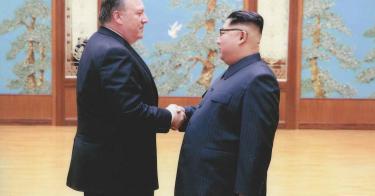North Korea today released Kim Dong-chul, Tony Kim (also known as Kim Sang-duk), and Kim Hak-song—three Americans it had been holding for over a year. It was a goodwill gesture ahead of the highly anticipated U.S.-North Korea summit. U.S. officials hope the release signals North Korean willingness to commit to conciliatory actions during the upcoming talks to get Pyongyang to denuclearize.
North Korea watchers have long called for the release of the three Americans. Those calls took on a new urgency last year, after Pyongyang freed University of Virginia student Otto Warmbier in a comatose state, only to die mere days after his return to the U.S. Warmbier had been sentenced to 15 years hard labor in a political prison camp after allegedly defacing a propaganda poster .
Like Warmbier, the three Americans released today had been charged with crimes against the state. Korean-American pastor Kim Dong-chul was sentenced to 10 years hard labor in April 2016 on charges of spying. Tony Kim and Kim Hak-song, both previously professors at Pyongyang University of Science and Technology, were taken into custody in early 2017. Tony Kim was charged for espionage, and Kim Hak-song was charged with hostile acts.
Trumped up charges against detained Americans are characteristic of North Korea’s disregard for the rule of law. Above the 38th parallel, there is no equal access to justice and no equal protection under the law. North Korea has publicly executed its own citizens merely for possessing a Bible or viewing or selling South Korean dramas. One alleged crime against the state can land an entire North Korean family—three generations’ worth—in prison camp. And incarceration in a political prison camp is often tantamount to a death sentence.
North Korea’s decision to release the three Americans is notable because it demonstrates that the regime responds to criticism of its human rights. This should embolden U.S. negotiators to raise equally pressing concerns regarding North Korea’s treatment of its own people. They suffer from a litany of human rights abuses, from brutal practices in the prison camps, to public executions, forced starvation, sexual violence and rape.
At the recent inter-Korean summit, South Korean representatives purposefully left human rights off the agenda, claiming that they needed more time to prepare to address such politically sensitive subjects. It was a missed opportunity.
Thus far, President Trump has taken a different approach. He used his State of the Union speech—and the presence of North Korean defector Ji Seong-ho—to highlight Pyongyang’s shameful human rights record. Later, he met with North Korean refugees in the Oval Office.
In February, Vice President Pence hosted Fred Warmbier, Otto Warmbier’s father, at the Opening Ceremonies of the Winter Olympics in South Korea.
Clearly, the Trump administration has made a rhetorical commitment to address human rights. Now, it should turn that rhetoric into action.
It serves American interests to address human rights as well as denuclearization at the upcoming summit.
In fact, raising human rights is one way that the U.S. can put pressure on North Korea. For example, the U.S. can amplify existing sanctions pressure by devising additional, targeted financial measures issued on human rights grounds. Negotiators can also increase pressure by requesting humanitarian access to prison camps or calling for closure of these camps.
As the meeting between the U.S. and North Korean leaders approaches, U.S. negotiators are thinking deeply about the give-and-take involved in negotiating with North Korea. There are areas for compromise, but some principles should not be sacrificed. The U.S. should demonstrate a holistic policy toward North Korea—one that prioritizes denuclearization without neglecting human rights.
The release of the three Americans is a good first step, but it’s just that, a first step toward addressing the broader corpus of human rights issues facing North Korea.
So Yeon Lee, a visiting Asan Fellow at The Heritage Foundation, contributed research for this report.
This piece originally appeared in Forbes https://www.forbes.com/sites/oliviaenos/2018/05/09/what-the-release-of-3-detainees-means-for-the-north-korea-summit/#2bd03e5c326f



